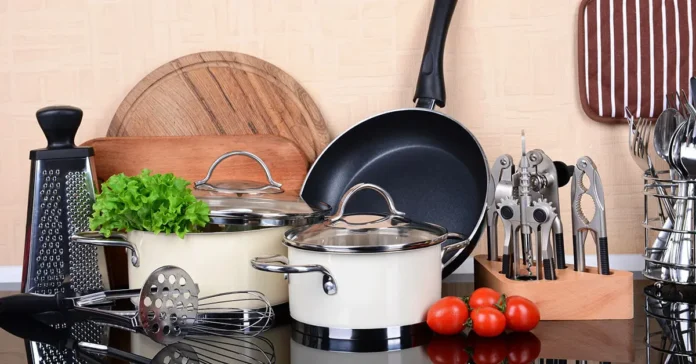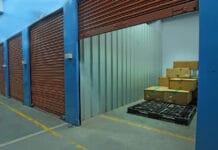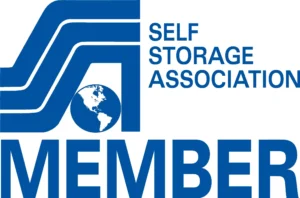Keeping your kitchen organized is essential, especially during renovation or relocation. A cluttered kitchen can make cooking stressful and inefficient, but with the right kitchen utensil organizers, you can transform your space into a tidy, functional area. These organizers are perfect for decluttering your countertops and drawers, ensuring that your utensils are easily accessible whenever you need them. Investing in quality utensil organisers can make a significant difference if you’re undergoing a kitchen renovation or want to refresh your space.
Consider using self-storage or utility storage solutions if you have too many utensils and insufficient space. These options allow you to store excess items securely, freeing up valuable kitchen space for everyday essentials. Additionally, a well-organized kitchen setup can help reduce stress and keep your daily routine running smoothly during a renovation or relocation. By decluttering and utilising effective storage solutions, you can maintain a clean, efficient kitchen environment.
Explore the top kitchen utensil organizers available and see how they can help you keep your space tidy, whether you’re renovating, relocating, or simply looking to improve your kitchen’s functionality.
How to Store the Kitchen Utensils?
Kitchen utensil organisers are crucial for maintaining a clean and efficient cooking space. These organizers help you declutter your countertops and drawers, making it easier to find and access your utensils when needed. By keeping everything in its place, you can save time during meal prep and avoid the frustration of searching for misplaced items.
Most meal preparation and cooking are done with utensils. When you need a tool, you often need it right away. Utensils are easily mixed up and knotted inside kitchen cabinets. They may jam the drawer, making it impossible to open it.
Suddenly, utensils appear to multiply, and we are often shocked by how many extras we have compared to what we need. Because of this, decluttering is the first step in these organisation methods. You must clean out your kitchen space and arrange your tools.
Here are some pointers to help you keep everything in its proper place:
- Build a method for storage
Organise your kitchen cabinets and drawers first. Make sure that each item has enough space. If you do not have enough room, consider storing your stuff on hooks or shelves.
- Set your utensil collection in order
Keep all your culinary utensils in one place. This way, you will not forget what you need next. Additionally, consider how you can stack your dishes. For instance, you may use a knife block or board to hold your knives.
- Locate suitable storage for your pots and pans
If your cookware is varied in size, find a place to keep it. A drawer or hook works well for smaller items like skimmers and spatulas. A shelf above the stove can be used to store larger pots and pans.
Questions to Ask yourself while Decluttering your Utensils
Try to go swiftly and not put off deciding what you want to keep and what you will donate as you go through your belongings. Consider posing these questions to yourself if you are feeling a little stuck:
- Do I employ this? You should not have to give this much thought. You can either use it or not. The question is NOT, “Will I potentially utilise this one day?”
- Is this an extra item? Are wooden spoons necessary in that quantity? Consider what you utilise often and what you need. For such “one-time” gatherings, remember that you may always borrow stuff from friends or family. Pick your favourite and give the extras to charity!
- Would I buy this now? This is an excellent question to ask when looking at new utensils. Consider whether you still adore it and whether it still fits your style. Does it make the room more functional or aesthetically pleasing, or is it merely adding to the clutter?
- Does this make life easier for me? There may be some things you use often but do not really require that add complexity to your life. For instance, we use our rice cooker at least a few times weekly. I could prepare rice on the stove instead of using the rice cooker, but it would make things less efficient. You can, without a doubt, splurge on some items – just make sure they are helpful to you!
Utensils to Declutter
The list that follows is only a place to get started. Do what works for you, keeping in mind that what is important to you might not be significant to others.
- Wooden spoons or other cooking utensils
- Baking equipment – Examine any excess, used, or unused cookie sheets, muffin tins, pie pans, etc.
- Cleaning products – Inventory your cleaning goods and throw away anything you do not use anymore. If you have more than one bottle of the same product, combine them. Position the empty bottles near the front of your collection to ensure that you use them up first.
- Food Storage Containers – Compare the lids and bottoms, and discard everything without a matching set. Donate whatever stuff you still have that you do not use or need.
- Cups for coffee and glasses – Consider what you need. Broken or chipped glasses should be recycled. If you have added, mismatched parts, let them go. If you collect coffee mugs, save your favourites to display and give the others to charity.
- Kitchen appliances—Despite how fantastic they seem, kitchen appliances are often underused. Donate any items you no longer use or if you already have something that can do the same purpose. Save nothing for “someday”; simply save what you need.
- Small kitchen equipment – Donate or sell it if you do not use it or if another appliance can complete the work. With these, you will get a lot of products for your money because they are often enormous space hogs!
How to Re-Organise your Kitchen after the Decluttering Process
There are various methods for keeping things ordered. Here are some suggestions for keeping your kitchen organised after the decluttering:
Use utensil organisers –
Utensil organizers make it easy to store knives, forks, and more. They come in a variety of sizes and forms, but the best ones are made expressly to keep your utensils arranged and hidden. While some people prefer plastic holders, others favour wooden ones. Make sure the organiser fits your cabinet nicely, regardless of the type you choose.
Keep Non-Essential Utensils in a Container –
After you have sorted out the necessities, it is time to separate and stow away the kitchenware you only use infrequently. Plastic storage containers can be a great, cost-effective choice. Organization containers can be used to keep specific categories of kitchen tools together. Then, these containers can be kept in the pantry, a separate drawer, or a cabinet.
Use a Kitchen Utensil Storage Container or Jug –
Although it is usually best to keep kitchen countertops uncluttered, sometimes leaving tools there makes sense. Keeping them in a utensil container on the counter may make sense if you do not have a spare drawer available.
Use creative solutions without drawers -
Without drawers, organising a kitchen might be a little more difficult. Here are some options:
- Utilise a pull-out bin to store utensils in a cabinet. The utensils are effectively stored in a drawer thanks to the pull-out bin.
- Hang utensils from a wall or the walls of a cupboard.
- Put utensils on the counter in a pitcher or other container.
- Hang utensils on the interior of cabinet doors.
Do not let the unusual storage problems in the kitchen overwhelm you. You can organise your kitchenware in a variety of ways. Any decluttering and reducing involves a process. Do not try to complete everything in one day; instead, focus on one topic at a time to avoid feeling overwhelmed and unmotivated. You will get the best results if you go slowly and always be honest about your resources and how you use them.
Final Words
In conclusion, investing in kitchen utensil organizers is a simple yet effective way to maintain a tidy and efficient cooking space. Whether dealing with a renovation, relocation or just looking to declutter, these organizers help keep your utensils accessible and your countertops clear. Organizing your kitchen can enhance your cooking experience, save time, and reduce stress. A well-organized kitchen looks better and functions more smoothly, making daily tasks easier and more enjoyable. Embrace the benefits of kitchen utensil organizers and create a more functional and inviting space in your home.
FAQs
A: A kitchen utensil organizer helps keep your utensils neatly arranged, making them easy to find and reducing clutter in your kitchen.
A: There are various types, including drawer inserts, countertop holders, wall-mounted racks, and magnetic strips, each designed to suit different storage needs.
A: Consider your kitchen layout, the number of utensils, and your storage preferences to select an organizer that fits your space and needs.
A: Yes, they can keep your utensils organized and easily accessible, even during a renovation, making the process more manageable.
A: Absolutely! Compact organizers like drawer dividers or wall-mounted options maximise space in small kitchens.
A: Regularly clean your organizers to prevent dust and grease buildup. Ensure utensils are placed back in their designated spots to maintain order.
A: Common materials include stainless steel, wood, plastic, and bamboo. Choose one that matches your kitchen’s style and is easy to clean.
A: Yes, utensil organizers can also hold other items like knives, spatulas, or even small gadgets, helping to keep your kitchen more organized.
A: They provide designated spots for each utensil, preventing clutter on countertops and in drawers, which makes your kitchen more functional.
A: You can find them at home goods stores, online retailers, or specialty kitchen shops, and they come in a variety of styles and sizes.








